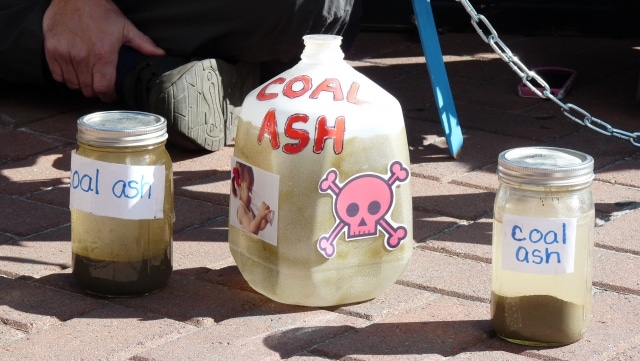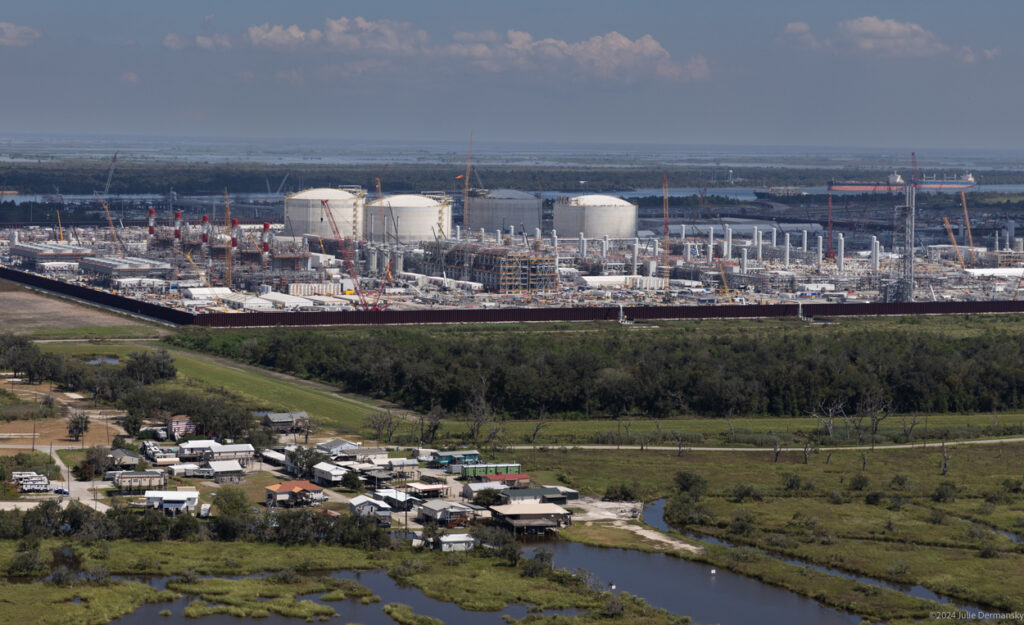This is a guest post by Rhiannon Fionn, an independent investigative journalist and filmmaker in post-production on the documentary film “Coal Ash Chronicles.”
North Carolina’s Department of Environmental Quality today announced a settlement agreement with Duke Energy, ending a lawsuit over the department’s $25.1 million fine for groundwater contamination resulting from coal ash stored at the company’s Sutton plant near Wilmington, N.C. Although the settlement covers groundwater contamination at 14 of Duke’s coal ash facilities and requires accelerated cleanup of groundwater contamination at four sites, activists and residents I spoke with today were not impressed by the announcement.
Since a judge approved the settlement, there will be no opportunity for public comment.
“I am again disappointed with the department, but not terribly surprised,” said Catawba Riverkeeper Sam Perkins. “This is an impressive new low,” he added. “They put a proposed fine out there, but they’ve not only reduced it, they diluted it to 14 sites.”
The state reports the settlement is for an estimated $20 million, though the company doesn’t agree. Paige Sheehan, a Duke representative, estimates the cost to remediate groundwater at its Sutton plant alone will run $3-$5 million, and less at smaller coal ash sites.
According to Sheehan, $7 million of the settlement http://www.duke-energy.com/news/releases/2015092901.asp will be paid by shareholders, but she left open the possibility that the company will seek a rate increase from the N.C. Utilities Commission to cover groundwater remediation costs.
In Nov. 2014, WRAL.com reported that Duke set aside $3.4 billion for coal ash cleanups in N.C., which includes the removal of much of the waste to lined landfills in multiple states.
Crystal Feldman, director of communications for DEQ, told me settlement negotiations began in March after Duke Energy sued the agency for levying the state-record $25 million fine against the company. Duke called the fine “unprecedented” and balked at the requirement to run municipal water lines when it was already doing so.
Duke’s Sheehan said the negotiations continued through last night and that an agreement was made just before the parties were to appear in court today.
North Carolina on the Defensive
When asked how the public benefits from the settlement and what “accelerated” remediation means, Feldman insisted that most of her comments be off-the-record. This is the only statement she wanted on the record:
“This is the single largest fine ever issued in North Carolina for environmental damages. We are the first administration against Duke Energy on coal ash. And this settlement allows us to hold Duke Energy accountable and to focus all of our efforts on the cleanup and closure process.”
But the state’s first coal ash regulations became law under a previous administration, and Feldman seemed unaware that Duke Energy’s groundwater assessment reports were conducted by third-party engineering firms. She was testy when asked why certain plants were left out of the settlement — including the site of the company’s Dan River coal ash spill in Feb. 2014, the third largest in U.S. history.
Feldman said the DEQ has received, but not reviewed, assessments for its Dan River and Riverbend sites. Riverbend is on the banks of the city of Charlotte’s main drinking water reservoir. Charlotte is the largest city in the state and the home of the company’s corporate headquarters.
The assessments submitted to DEQ are available on the state’s website, and executive summaries appear on the company’s website. Sheehan stated that each assessment can run 1,000 pages or more.
The North Carolina General Assembly has given the company until 2019 to clean up much of its coal ash across the state, and the U.S. Environmental Protection Agency’s coal ash regulations take effect next month.
Clean Water for the People
When Duke Energy’s Sheehan was asked how this settlement benefits the public, she stated:
“We want to move forward. We want to move ash basins in ways that are smart, that protect people and the environment. It helps us clear away a legal distraction and focus on the important work” of a cleanup.
Hundreds of residents in North Carolina near multiple coal ash sites have been warned by the state not to use or drink their well water. Besides the Sutton plant, there are no disclosed plans to run municipal water to residents with contaminated well water. Sheehan says Duke Energy has begun construction on water lines in the Wilmington area.
At a press conference held by activists in the state’s capitol last week, Larry Mathis of Belmont, N.C. had this to say:
“Our water had been tested by [DEQ], and was found to have 38 times the state standard for Vanadium. It has 28.6 times the standard for hexavalent chromium. The more I’ve learned, the more concerns I have about health and safety. Our property values have suffered as well. Who wants to live in a place with contaminated water, contaminated land and dirty air?”
Mathis also stated that the bottled water provided by Duke Energy would only be supplied to residents for two more months.
At that same press conference, the Raging Grannies, a non-violent activist group united with other activist groups on the coal-ash issue in N.C. sang a song for Duke Energy. Watch it:
Rhiannon Fionn is an independent investigative journalist and filmmaker in post-production on the documentary film “Coal Ash Chronicles.”
Image credit: Rhiannon Fionn via Flickr
Subscribe to our newsletter
Stay up to date with DeSmog news and alerts







